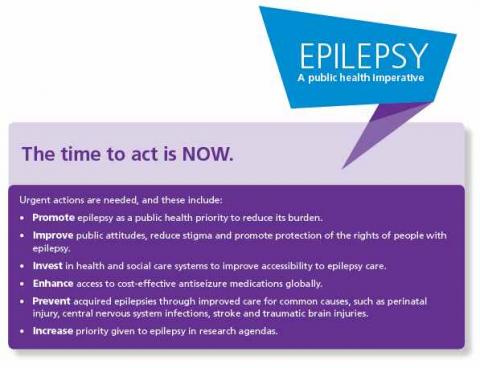
Epilepsy affects nearly 50 million people of all ages around the world. A new report published by the World Health Organisation, “Epilepsy, a public health imperative” presents a comprehensive picture of the impact of the condition on people with epilepsy, their families and communities.
The report states that it is imperative to substantially scale up global efforts to address epilepsy.
It calls for sustained and coordinated action to highlight epilepsy as a public health imperative, to increase investment in reducing its burden, and to advocate for actions to address gaps in epilepsy knowledge, care and research.
It also calls for action to ensure all people with epilepsy around the world have the opportunity to live free from stigma and discrimination. It says that “the human rights violations faced by people with epilepsy around the world are unacceptable”.
The report particularly focuses on low-income countries, where 75% of people living with epilepsy do not have access to effective and low-cost anti-seizure medicines. As a result, their risk of dying prematurely is increased and many are condemned to a life of stigma.
“The treatment gap for epilepsy is unacceptably high, when we know that 70% of people with the condition can be seizure-free when they have access to medicines that can cost as little as US$5 per year and can be delivered through primary health systems,” said Dr Tarun Dua, from WHO’s Department of Mental Health and Substance Abuse.
The report estimates that 25% of cases globally can be prevented. It outlines that effective interventions can be delivered as part of broader public health responses in maternal and newborn health care, communicable disease control, injury prevention and cardiovascular health.
In low- and middle-income countries, early death among people with epilepsy is significantly higher than in high-income countries. Stigma about the condition is also widespread. “The stigma associated with epilepsy is one of the main factors preventing people from seeking treatment,” said Dr Martin Brodie, President of the International Bureau for Epilepsy. “Many children with epilepsy do not go to school and adults are denied work, the right to drive and even to get married. These human rights violations experienced by people with epilepsy need to come to an end.”
The report also looks at co-morbidities. It finds that roughly half of adults with epilepsy have at least one other health condition. The most common are depression and anxiety: 23% of adults with epilepsy will experience clinical depression during their lifetime and 20% will have anxiety. Mental health conditions such as these can make seizures worse and reduce quality of life. Development and learning difficulties are experienced by 30-40% of children with epilepsy.
This report is the product of a long-standing collaboration between WHO, the International League Against Epilepsy (ILAE) and the International Bureau for Epilepsy (IBE).
The Report can downloaded from the WHO website
